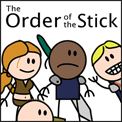Morality and Evolution
I'm a staunch evolutionist. Ever since I read Richard Dawkins' The Blind Watchmaker, I began to understand the subtlety and power of the the idea that incremental changes brought about through natural variation can produce complex structures when under the influence of selective forces. Think about it: imagine you have a bunch of different machines that generate numbers. Each one generates numbers in diffent ways. Now imagine that you decide that machines that generate the number 666 are evil and should be destroyed. So you destroy a machine whenever the evil number comes up. Eventually, you will be left only with the machines that don't generate that number, or are so unlikely to generate it that maybe you didn't notice.
The idea is so simple it seems almost obvious. Like Einstein's general theory of relativity, evolution as a concept is one of those ideas it seems amazing we didn't discover earlier. And it seems that despite the vocal minority of those who feel threatened by science, evolution as a concept has proven more and more predictive since Darwin's seminal The Origin of Species written in 1859. Now, according to an article in today's New York Times, this model is even being applied with scientific rigor to the realm of ethics.
Biologist Marc D. Hauser has released a new book called Moral Minds in which he argues that human morality is the expression of a "moral grammar" that has been written into human DNA through the process of "group selection". This is not to say that the ideas are not controversial, but it represents a daring exploit of biological science into the realm of inquiry once reserved for religion and philosophy. It's theoretical work to be sure, but could represent a new way of looking at human behavior in an evolutionary light.
Hauser's use of the term "grammar" to describe the appartus within the human animal that inform his moral decisions is no accident. He wrote a paper in collaboration with Noam Chomsky (famous for his work on grammar's "deep structure" embedded in the human brain) and Dr. Tecumseh Fitch about the possible evolution of animal communication systems as adaptations of navigation systems. He believes that moral systems, like language systems, benefit societies of animals as a whole and thus promote the survival of its members. This process of "group selection," while still controversial, is particularly applicable to human beings, who Hauser believes show a penchant for social conformity.Dr. Hauser presents his argument as a hypothesis to be proved, not as an established fact. But it is an idea that he roots in solid ground, including his own and others’ work with primates and in empirical results derived by moral philosophers.
The proposal, if true, would have far-reaching consequences. It implies that parents and teachers are not teaching children the rules of correct behavior from scratch but are, at best, giving shape to an innate behavior. And it suggests that religions are not the source of moral codes but, rather, social enforcers of instinctive moral behavior.
—New York Times, "An Evolutionary Theory of Right and Wrong"

 RSS
RSS

